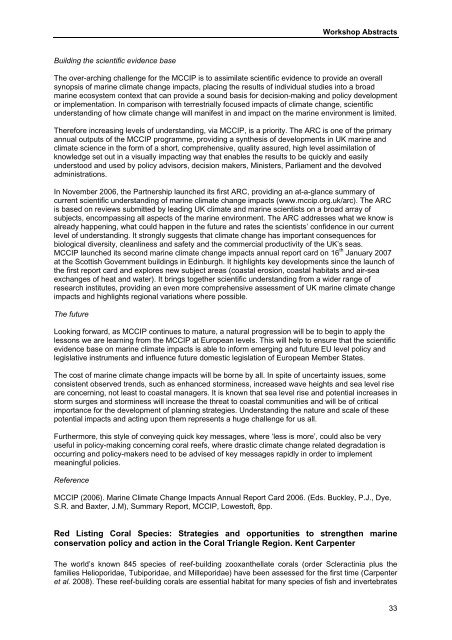Obura2009-IUCN Congress report - Resilience sessions
Obura2009-IUCN Congress report - Resilience sessions.pdf
Obura2009-IUCN Congress report - Resilience sessions.pdf
Create successful ePaper yourself
Turn your PDF publications into a flip-book with our unique Google optimized e-Paper software.
Workshop Abstracts<br />
Building the scientific evidence base<br />
The over-arching challenge for the MCCIP is to assimilate scientific evidence to provide an overall<br />
synopsis of marine climate change impacts, placing the results of individual studies into a broad<br />
marine ecosystem context that can provide a sound basis for decision-making and policy development<br />
or implementation. In comparison with terrestrially focused impacts of climate change, scientific<br />
understanding of how climate change will manifest in and impact on the marine environment is limited.<br />
Therefore increasing levels of understanding, via MCCIP, is a priority. The ARC is one of the primary<br />
annual outputs of the MCCIP programme, providing a synthesis of developments in UK marine and<br />
climate science in the form of a short, comprehensive, quality assured, high level assimilation of<br />
knowledge set out in a visually impacting way that enables the results to be quickly and easily<br />
understood and used by policy advisors, decision makers, Ministers, Parliament and the devolved<br />
administrations.<br />
In November 2006, the Partnership launched its first ARC, providing an at-a-glance summary of<br />
current scientific understanding of marine climate change impacts (www.mccip.org.uk/arc). The ARC<br />
is based on reviews submitted by leading UK climate and marine scientists on a broad array of<br />
subjects, encompassing all aspects of the marine environment. The ARC addresses what we know is<br />
already happening, what could happen in the future and rates the scientists’ confidence in our current<br />
level of understanding. It strongly suggests that climate change has important consequences for<br />
biological diversity, cleanliness and safety and the commercial productivity of the UK’s seas.<br />
MCCIP launched its second marine climate change impacts annual <strong>report</strong> card on 16 th January 2007<br />
at the Scottish Government buildings in Edinburgh. It highlights key developments since the launch of<br />
the first <strong>report</strong> card and explores new subject areas (coastal erosion, coastal habitats and air-sea<br />
exchanges of heat and water). It brings together scientific understanding from a wider range of<br />
research institutes, providing an even more comprehensive assessment of UK marine climate change<br />
impacts and highlights regional variations where possible.<br />
The future<br />
Looking forward, as MCCIP continues to mature, a natural progression will be to begin to apply the<br />
lessons we are learning from the MCCIP at European levels. This will help to ensure that the scientific<br />
evidence base on marine climate impacts is able to inform emerging and future EU level policy and<br />
legislative instruments and influence future domestic legislation of European Member States.<br />
The cost of marine climate change impacts will be borne by all. In spite of uncertainty issues, some<br />
consistent observed trends, such as enhanced storminess, increased wave heights and sea level rise<br />
are concerning, not least to coastal managers. It is known that sea level rise and potential increases in<br />
storm surges and storminess will increase the threat to coastal communities and will be of critical<br />
importance for the development of planning strategies. Understanding the nature and scale of these<br />
potential impacts and acting upon them represents a huge challenge for us all.<br />
Furthermore, this style of conveying quick key messages, where ‘less is more’, could also be very<br />
useful in policy-making concerning coral reefs, where drastic climate change related degradation is<br />
occurring and policy-makers need to be advised of key messages rapidly in order to implement<br />
meaningful policies.<br />
Reference<br />
MCCIP (2006). Marine Climate Change Impacts Annual Report Card 2006. (Eds. Buckley, P.J., Dye,<br />
S.R. and Baxter, J.M), Summary Report, MCCIP, Lowestoft, 8pp.<br />
Red Listing Coral Species: Strategies and opportunities to strengthen marine<br />
conservation policy and action in the Coral Triangle Region. Kent Carpenter<br />
The world’s known 845 species of reef-building zooxanthellate corals (order Scleractinia plus the<br />
families Helioporidae, Tubiporidae, and Milleporidae) have been assessed for the first time (Carpenter<br />
et al. 2008). These reef-building corals are essential habitat for many species of fish and invertebrates<br />
33


















